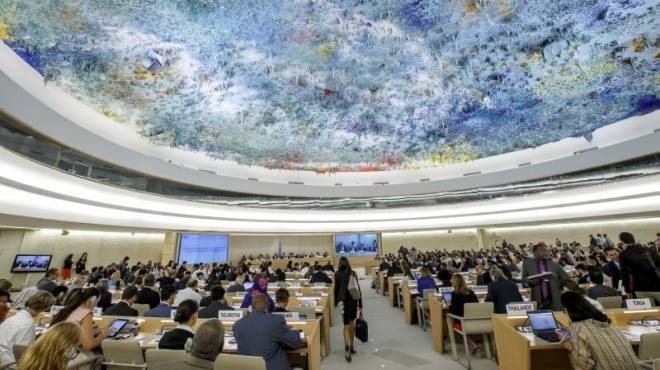Geneva: In yet another sharp rebuff to the UNHCHR’s reference to Jammu and Kashmir, India on Tuesday said it was concerned at “persisting ambiguities” in the UN body’s governance and asserted that the violence in the state was “choreographed” from across the border.
Hitting out at Pakistan, India also emphasised that it has shared evidence of terrorists who came across the border with instructions to target the security forces by mingling with protesting crowds and using them as human shields.
“Terrorism, I would emphasise, is the most egregious violation of human rights,” India’s Ambassador and Permanent Representative at the UN in Geneva, Ajit Kumar, said during the General Debate on the oral update by the United Nations High Commissioner for Human Rights (UNHCHR) during the 33rd Session of Human Rights Council.
India also stated that the whole state of Jammu and Kashmir is its integral part while Pakistan remains in illegal occupation of a part of its territory and the “two cannot and should not be equated”.
“The neutrality of the phrase ‘Indian-administered Kashmir’ is, therefore, artificial. Furthermore, the state of Jammu and Kashmir has an elected democratic government that represents all sections of the people unlike the situation in Pakistan-occupied Kashmir,” the Indian envoy said.
India in its statement said, “We have noted the reference in the High Commissioner’s statement to the situation in the Indian State of Jammu and Kashmir”.
“The current violence in Jammu and Kashmir has been choreographed from across our border since the death of a known terrorist belonging to an internationally proscribed terrorist organisation in police action in July this year.
“We have shared evidence of terrorists who came across the border with instructions to target our security forces by mingling with protesting crowds and using human shields,” he said.
“It will be in the fitness of things if Pakistan focuses its energies on improving human rights situation within Pakistan and PoK,” the Indian ambassador to UN said.
India also attacked Pakistan for human rights abuses in Balochistan. “Pakistan is characterised by authoritarianism, absence of democratic norms and widespread human rights violations across the country, including in Balochistan,” the statement said.
Responding to India at the UNHRC, the Pakistani ambassador did not mention PoK or Balochistan in his statement.
In sharply critical comments, India said it has been appreciative of the High Commissioner’s efforts at improving efficiency and streamlining OHCHR’s work, however, it remained “concerned at persisting ambiguities in OHCHR governance and administrative arrangements. High Commissioner’s proposed Change Initiative requires more clarity.”
Kumar also stressed that Jammu and Kashmir has started to move towards normalcy after sustained and system-wide efforts by both the central and the state governments, including the exercise of maximum restraint by the security forces, 7000 of whom have sustained injuries till date.
India’s statement came in reaction to the remarks by the UN High Commissioner for Human Rights Zeid Ra’ad Al Hussein on the situation in Jammu and Kashmir.
In his opening statement at the meet, Hussein had said, “We had previously received reports, and still continue to do so, claiming the Indian authorities had used force excessively against the civilian population under its administration. We furthermore received conflicting narratives from the two sides as to the cause for the confrontations and the reported large numbers of people killed and wounded.
“I believe an independent, impartial and international mission is now needed crucially and that it should be given free and complete access to establish an objective assessment of the claims made by the two sides,” Hussein said.
India also thanked the High Commissioner for his update on the situation of human rights and OHCHR activities since the last HRC Session.
“However, more would be gained if primacy were accorded to cooperation over confrontation with states concerned as the guiding principle in our collective effort,” India said.
“India’s robust democratic institutions and processes have sufficient tools for redressal of grievances and they are already engaged with this issue across the entire democratic political spectrum,” it said.
India asserted that the protection and promotion of human rights on a sustained basis can be best achieved through constructive dialogue and cooperation.
“States are the primary bearers of responsibility in this regard; countries often have unique national circumstances, and it is important to invest trust in their efforts. India also reiterated its commitment to extend full cooperation to the High Commissioner and OHCHR for the meaningful and productive discharge of his mandate.
PTI

